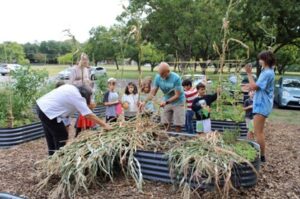
The Temple Shalom Justice Garden is dedicated to the memory and generosity of past Brotherhood President, Chuck Cera and his wife, Joan, a Sisterhood and Traditions volunteer.
WHAT is the vision for the Community Garden and what are the stages?
The Temple Shalom Justice Garden is a multi-purpose, three-phased program garden that began in 2022 as an education garden used for teaching purposes within Temple Shalom.
 Phase 1
Phase 1
From April 2022 to November 2022, Temple Shalom planned, constructed and launched The Temple Shalom Justice Garden. The garden currently consists of twelve garden beds. Eight beds are for vegetable and herb production and four are for ecological support with native plants to serve as food and nesting sources for pollinators.
In the initial phase, Temple Shalom:
- Recruited and trained volunteer garden team leaders and a small core team
- Trained the garden team using the local Texas A&M Agri-Life extension office and local master gardener volunteers
- Offered garden-focused programs for Temple Shalom members and religious school students
- Hosted four education programs that taught participants how gardens can address food justice and ecological justice as well as how to build soil, plant seedlings and seeds, and tend plants
- Planted wildflower seeds in our large lawn to improve our landscape
- Initiated a collaborative program with the Dallas Council on Jewish Scouting to carry out projects to broaden our ecological impact through the building of a Pollinator Pathway of native plants and nectar sources and building additional no-dig garden beds for future vegetable production
- Sought to build collaborations within the community in anticipation of expanding our programming and constructing the food justice garden.


Phase 2
In 2023, Temple Shalom will commence Phase 2 of the garden program and undertake strategic planning for our future justice garden, including advancing our educational programs and investing in curriculum for learners of all ages.
We will also begin improving the existing garden so that it can be used as a classroom, healing space and worship area for congregational group use.
In 2023, Temple Shalom will start a quarterly education program using a Forest School philosophy to teach programs on religious studies, sciences, and arts to learners of all ages. Finally, we will begin quarterly learning programs on gardening, cooking, and nutrition that will be open to both Temple Shalom learners and later the public as the program expands.
Phase 3
Temple Shalom sits in the center of financial and food insecurity among our neighbors. The Dallas Independent School District and the Richardson Independent School Districts serve a large number of food-insecure children and families. Given our multi-acre location between the two school districts, we are uniquely situated to help reduce hunger and the consumption of highly processed foods in our community through garden-based education.
In Phase 3, Temple Shalom will begin building a food justice garden of more than 40 raised garden beds and several in-ground garden beds. We intend to grow produce to donate to organizations that reduce food insecurity in the Dallas-Richardson or North Texas area, and to design programming around food and nutrition, food justice and ecological justice, and nature as a healing space.
WHERE did the idea come from?
For years many congregants had felt that one of Temple Shalom’s greatest assets, its land, could be used in a way that furthered our mission. In 2021, we were able to build on that interest and start our community garden.
WHY did you feel this was the right time to start the Community Garden?
One of the by-products of our collective COVID experience is a focus on those around us and how we can always better the situation. The time is always right when you have reached an inflection point of interest, knowledge and opportunity.
HOW do you see it affecting the greater community and how can we, as a congregation, support your efforts?
The Temple Shalom Garden will benefit the greater community by expanding the existing garden to include a food justice garden, by developing additional educational programming around food and nutrition/ecological justice, and by creating a more beautiful and sustainable healing space for our community.
There are so many ways to engage with and support the garden!
- Volunteer on our regular scheduled work days: Sundays (9:30 AM -11:30 AM) and Tuesdays (9:30 AM – 11:30 AM – need RSVP). Signup here.
- Volunteer during special events
- Participate in garden programming
- Get creative! How can your committee or other Temple Shalom group incorporate the garden into your programming?
